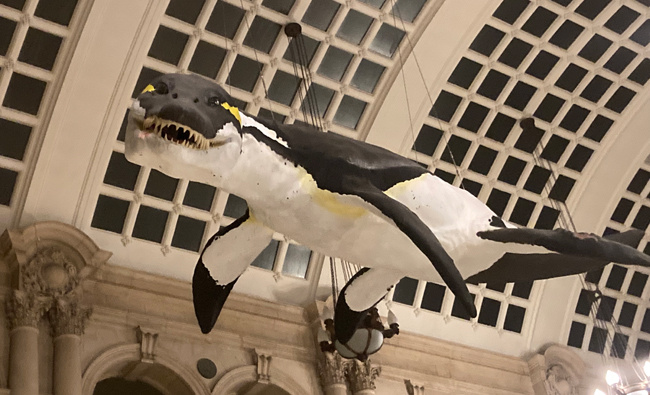Dorset “Super Predator” Skull Goes on Display at Local Museum
Gigantic Pliosaur Skull Goes on Display to the Public
One of the most spectacular fossil finds from the Jurassic coast of southern England is going on display at a Dorset museum – the skull of one of the largest, most ferocious predators known to science. The skull and the impressive jaws are from a pliosaur, a short-necked plesiosaur (marine reptile) that ruled the waves of the Jurassic seas. It certainly was an apex predator, capable of attacking and killing any other marine animal, an encounter with this huge pliosaur for any unwary Ichthyosaurus or plesiosaur would surely have ended in these reptiles being dinner for this enormous sea monster.
Pliosaur
At the time the jaw bones were first discovered, one of the researchers commented that Tyrannosaurus rex would have been a “kitten” in comparison with this fierce carnivore.
A Museum Exhibit of a Pliosaur

The life-size replica of the pliosaur (P. carpenteri) suspended from the ceiling at the Bristol Museum and Art Gallery. Pliosaurus carpenteri was formally named and described in 203 (Benson et al). Picture credit: Everything Dinosaur.
Picture credit: Everything Dinosaur
Huge Marine Reptile
Although the rest of the skeleton was never found, scientists have estimated that this creature could have been between ten and sixteen metres long. The fossil bones once collected by an local, amateur fossil collector were then sold to Dorset County Council with the aim of putting them on display at the local museum – providing visitors to Dorset an idea of just how dangerous the seas were in the area around 160 million years ago.
Steps have been taken to try to determine whether this is a new species but as yet, staff members at Everything Dinosaur have not received confirmation that the fossils do represent a new type of previously unknown pliosaur.
To read an article on the research into this pliosaur skull: Scanning a Pliosaur – the search for a new species.
The English palaeontologist, Dr David Martill, an expert on Jurassic marine reptiles commented on the discovery saying:
“These creatures were monsters! They had massive, big muscles on their necks, and you would have imagined that they would bite into the animal and get a good grip, and then with these massive neck muscles they probably would have thrashed the animals around and torn chunks off. It would have been a bit of a blood bath.”
Now that the fossilised bones and teeth have been prepared and the jaws fixed in a “open gape” posture this specimen is ready for display at the Dorset County Museum in Dorchester.
For models of marine reptiles including Pliosaurus (whilst stocks last): CollectA Deluxe Prehistoric Life Replicas.

